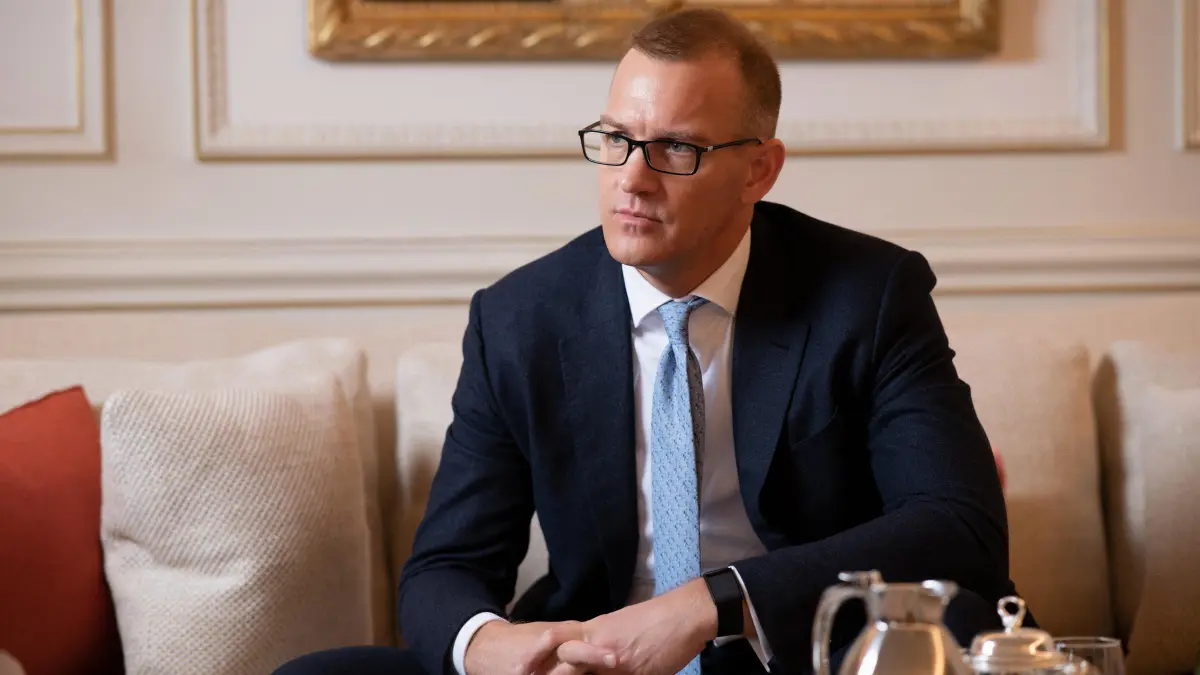Daniel Kretinsky stunned the City when he revealed plans to take over the owner of Royal Mail.
And it was an even bigger surprise to many when the board of International Distribution Services (IDS), the delivery business’s parent company, unanimously backed the Czech billionaire’s £3.6billion offer.
Royal Mail’s privatisation back in 2013 had been controversial enough. But the decision by IDS’s directors means the 508-year-old postal service, set up by Henry VIII, could fall into foreign hands for the first time in its history.
Chairman Keith Williams said the board were ‘acutely aware of their responsibilities, particularly to the unique heritage of Royal Mail’.
But they have faced a backlash from unions and politicians.
Backlash: Czech billionaire Daniel Kretinsky’s £3.6bn offer for Royal Mail has been given the stamp of approval
The directors are set to pocket a total of £677,621 from the sale. Williams is in line for £210,160 and Martin Seidenberg, IDS’s German chief executive, will receive £264,316, according the formal takeover offer document.
The Government and the Communication Workers Union (CWU) have sought guarantees about the future of the postal service and its workforce.
CWU general secretary Dave Ward has said the sale to a foreign owner ‘doesn’t feel right’ as ‘nothing gets more British than Royal Mail’.
Kretinsky has already made several promises, including keeping the Royal Mail name and brand, and retaining its UK headquarters and tax residency to keep it tied to Britain.
But Labour last week vowed to ‘robustly scrutinise’ the deal and give postal workers a ‘stronger voice’ in a pre-election pledge.
Shareholders will vote on the deal at IDS’s next annual general meeting in September.
And the directors – custodians of an historic British institution – will urge them to allow it fall into foreign hands.
These are the board members who have agreed to the sale.

Hopes: Labour last week vowed to ‘robustly scrutinise’ the deal and give postal workers a ‘stronger voice’ in a pre-election pledge
Keith Williams
Chairman
The former British Airways boss has chaired IDS since 2019 and has been on the board for six years in total.
Williams was hired by Royal Mail with a track record of dealing with industrial disputes that it was hoped would help settle the seemingly intractable conflict with unions at the postal services.
As a boss at British Airways he had helped diffuse a long-running row between the airline and cabin crews in 2011.
Martin Seidenberg
Chief executive
The German businessman was tasked with a big turnaround job when he took the reins at IDS last year.
He had previously run GLS –the European parcel service also owned by IDS – since 2020 and before that spent 15 years at courier giant DHL Group.
He joined IDS with a mandate to turn the firm’s fortunes around, which has included lobbying Ofcom and the Government to reform the Universal Service Obligation, which includes delivering letters from Monday to Saturday and parcels from Monday to Friday.
Plans on the table would reduce the Royal Mail’s second class service to every other day.
Michael Snape
Chief financial officer
Snape was appointed as IDS’ group chief financial officer in January.
He was finance chief at Boots for five years. He has also held senior roles at Tesco, Waitrose and Sainsbury’s.
Baroness Hogg
Senior independent Non-executive director
Baroness Hogg became the first woman to lead the board of a FTSE 100 company when she was appointed chairman of venture capital group 3i in 2002.
She stepped down in 2010 to become chairman of the Financial Reporting Council, the accounting regulator.
A veteran of company boards, she was awarded The Sunday Times’ lifetime achievement award for non-executive directors in 2017.
She has also had a career in government, having been the lead independent non-executive director at the Treasury and head of the Prime Minister’s policy unit under John Major.
Maria da Cunha
Non-executive director
The trained solicitor joined the IDS board in 2019 after an 18-year career at British Airways, where she was director of people and head of legal and government and industry affairs.
Previously she sat on the board of De La Rue, the company that prints banknotes for the Bank of England.
Alongside her role at IDS, she is on the panel of the Competition and Markets Authority, the watchdog, and is a director at housing association L&Q and law firm Irwin Mitchell.
Michael Findlay
Non-executive director
Findlay is the chairman of London Stock Exchange and of construction group Morgan Sindall.
He had a 27-year career in investment banking including stints at Robert Fleming & Co, UBS and Bank of America Merrill Lynch.
Lynne Peacock
Non-executive director
Peacock is a senior independent director of outsourcing Serco and deputy chairman of insurer Royal London Group.
Previously she was the chief executive of National Australia Bank Europe and led building society The Woolwich. She has sat on the boards of Standard Life Aberdeen, Scottish Water, Nationwide and TSB.
Shashi Verma
Non-executive director
Verma is the director of strategy and chief technology officer at Transport for London.
He is responsible for the operation of London’s transport revenue collection system and implemented contactless payments across TfL’s network.
Jourik Hooghe
Non-executive director
Hooghe is chief financial officer of aviation services firm Swissport International.
He has been executive vice president and finance chief at budget airline Wizz Air.
Prior to that Hooghe spent 18 years working at consumer goods giant Procter & Gamble including a time as head of global strategy.
Ingrid Ebner
Non-executive director
Ebner has a background in logistics, having spent 21 years at Amazon, including as director of supply chain operations in continental Europe.
She is a vice president at shipping giant Maersk’s e-commerce logistics arm.
Mark Amsden
Group general counsel and company secretary
Amsden was general counsel and company secretary at Morrisons, and interim company secretary at Yorkshire Water.
He was formerly a partner at law firm Addleshaw Goddard.
Some links in this article may be affiliate links. If you click on them we may earn a small commission. That helps us fund This Is Money, and keep it free to use. We do not write articles to promote products. We do not allow any commercial relationship to affect our editorial independence.
Source link



